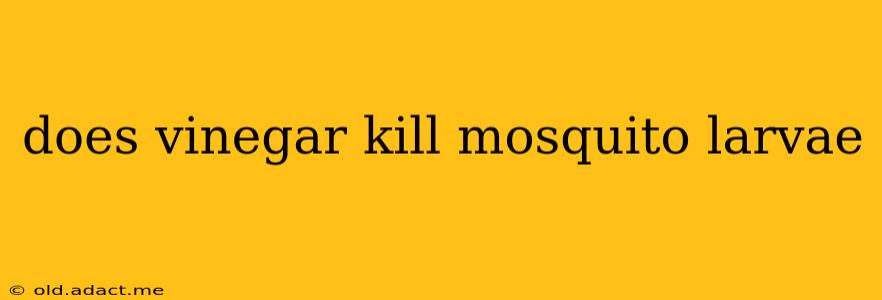Does Vinegar Kill Mosquito Larvae? A Deep Dive into Mosquito Control
Mosquitoes are a persistent nuisance, and their larvae can quickly infest standing water. Many people turn to natural methods for control, and vinegar is often suggested. But does vinegar kill mosquito larvae? The answer is more nuanced than a simple yes or no.
While vinegar isn't a potent larvicide like some chemical treatments, it can have an effect, but its effectiveness depends on several factors. Let's delve into the specifics.
How Does Vinegar Affect Mosquito Larvae?
Vinegar's primary active ingredient is acetic acid. This acid can disrupt the delicate environment needed for mosquito larvae to thrive. At high concentrations, the acidic nature of vinegar can negatively impact the larvae's development, potentially leading to death. However, it's crucial to understand that vinegar's effectiveness is limited by several factors.
What Concentration of Vinegar is Needed to Kill Mosquito Larvae?
This is a crucial question, and the answer is: it's difficult to pinpoint an exact concentration. The effectiveness depends on the type of vinegar (white vinegar is generally used), the pH of the water, the stage of larval development, and the species of mosquito. Simply pouring a small amount of vinegar into standing water is unlikely to be effective against a large infestation. Moreover, high concentrations of vinegar could also harm beneficial organisms in the water.
Is Vinegar a Reliable Method for Mosquito Larvae Control?
No, vinegar alone isn't a reliable method for comprehensive mosquito larvae control. While it might kill some larvae in small quantities of water, it's not a practical solution for larger infestations. For significant impact, you'd need impractically large amounts of vinegar, which would be both expensive and environmentally unfriendly.
What are Better Alternatives for Mosquito Larvae Control?
For effective mosquito larvae control, consider these options:
-
Bacillus thuringiensis israelensis (Bti): This bacterium is highly effective against mosquito larvae and is considered safe for humans, pets, and most other wildlife. It's available commercially in various forms, including dunks and granules.
-
Mosquito Dunks: These slow-release Bti products are easy to use and environmentally friendly. Simply place them in standing water.
-
Eliminating Standing Water: The most effective method is to eliminate standing water sources where mosquitoes breed. This includes emptying flowerpots, fixing leaky faucets, and regularly cleaning gutters.
-
Gambusia affinis (mosquitofish): These small fish are natural predators of mosquito larvae and can be introduced into ponds and other larger water bodies (check local regulations before introducing any species).
Does Vinegar Repel Adult Mosquitoes?
While vinegar might not directly kill mosquito larvae, there's some anecdotal evidence suggesting its scent might repel adult mosquitoes. However, scientific evidence supporting this claim is limited, and other repellents are far more effective. Citronella candles and DEET-based repellents are far more reliable for repelling adult mosquitoes.
Can I Use Vinegar to Clean Mosquito Breeding Grounds?
Vinegar can be part of a larger cleaning strategy for mosquito breeding grounds. Using vinegar to clean containers that may have held stagnant water can help remove any remaining larvae or eggs, but it should be coupled with thorough cleaning and drying.
In summary, while vinegar might have a minor effect on mosquito larvae under specific circumstances, it's not a reliable or efficient method for mosquito control. Using proven larvicides and eliminating breeding grounds are far more effective strategies.
